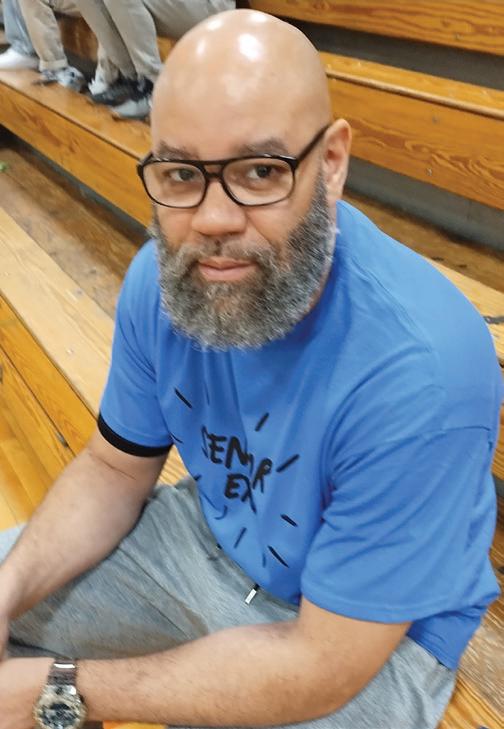




By Jasmine McBride Staff Writer
n February 2024, Willie Crump, an inmate housed at Faribault Minimum Security Prison at the time, reached out to MSR claiming he faced retaliation after publishing an opinion piece about the prison’s conditions.
Crump’s story, which centered around the dire state of Faribault and his struggles with the Minnesota Department of Corrections (DOC), prompted MSR to follow up with him a year later, especially after his transition from Faribault to the 180 Degrees halfway house at 236 Clifton Avenue in Minneapolis.
Since MSR’s article was published on February 1, 2025, Crump has been sent back to prison. His attorney, Michael McLaughlin, who represented him in a case against the DOC, condemned the hearing that led to Crump’s re-incarceration as prejudiced and unconstitutional.
“Inmates on work leave have a right to due process,” said McLaughlin. “The DOC made it so all that needed to be shown is that 180 Degrees terminated him. But they didn’t provide an examination as to why.”
According to McLaughlin, Crump was not given an op-
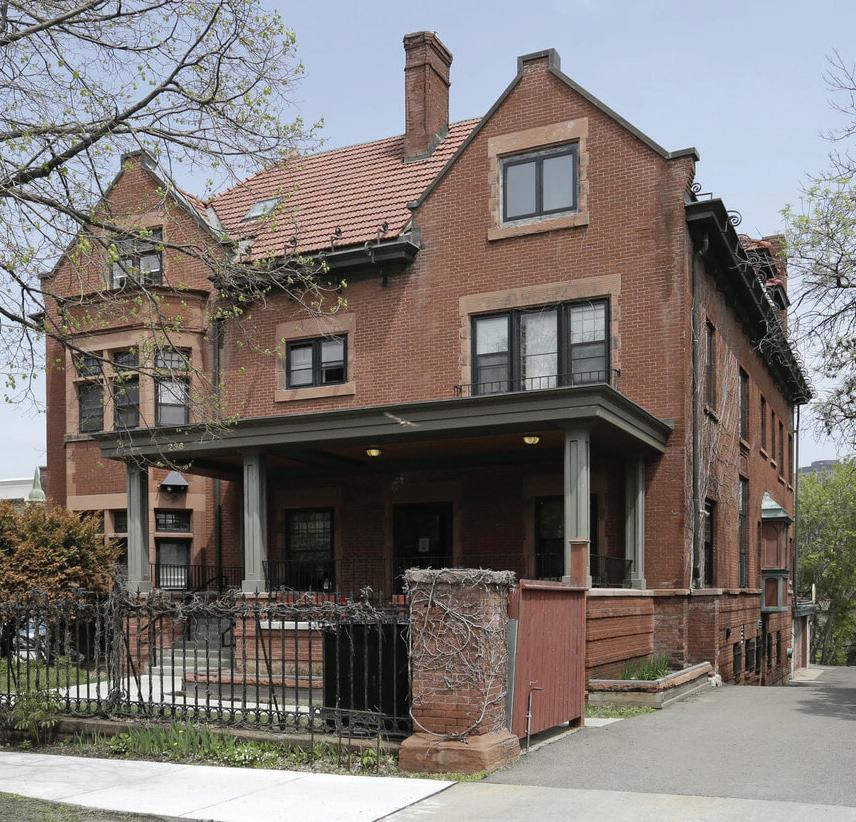
portunity to present a defense. The court simply informed him that his work release had been revoked and that he would be sent back to prison. McLaughlin asserts that Crump’s defense centered on the belief that his termination from the halfway house was retaliatory — a consequence of his outspoken criticism of the living conditions at Clifton House. Crump’s claims about Clifton House mirror his previous criticisms of Faribault Prison.
He alleged that conditions at the halfway house were un-
safe, unsanitary, and violated basic human rights. Among the issues he highlighted were mold, asbestos, unsafe drinking water, pest infestations, a lack of hygiene facilities, and the misuse of both organizational and personal funds. He also described instances of mistreatment by the DOC and Clifton House staff, further accusing the facility of retaliation for his complaints. Crump even raised concerns about potential fraud involving his Social Security number.
■ See INMATE on page 5
By Clint Combs Staff Writer
resident Donald Trump’s recent executive orders have stirred controversy, particularly regarding the Department of Education’s handling of Diversity, Equity
wing indoctrination.”
His orders, for example, include dismantling civil rights protections that seek to address systemic inequalities in education. Trump appointed Linda McMahon, a businesswoman with limited background in education, to lead
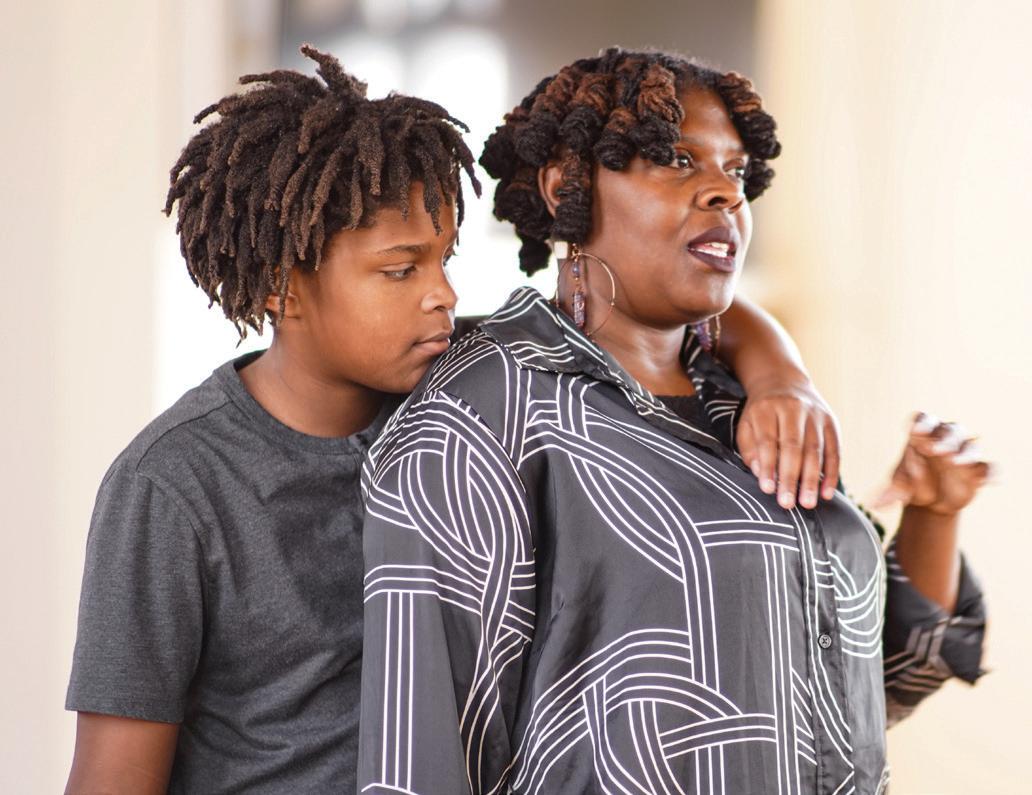
and Inclusion (DEI) programs. His administration’s directive challenges the continued preservation of DEI initiatives, viewing them as a form of “left-
efforts aimed at rolling back these programs.
For years, Black students, families and communities have faced systemic obstacles that
limit their access to fair educational opportunities. Despite these challenges, local organizations are working tirelessly to support Black students and their families. In Minneapolis, two organizations — the Black Family Blueprint and Network for the Development of Children of African Descent (NdCAD) — are playing an essential role in providing education and support to Black communities.
The Black Family Blueprint, founded by Ayolanda and Mujasi Jaara Bandele, offers a comprehensive program to empower Black families, focusing on education, emotional healing, and overall well-being. The program aims to level the playing field by ensuring that Black families have the tools, resources and opportunities they need to succeed. One of its cornerstone initiatives, “Parenting Against White Supremacy,” addresses the unique challenges Black parents face in raising children in a society that often marginalizes them.
“We know that Black families are continuously impacted by systems that aren’t designed with us in mind,” said Ayolanda Bandele. “Our work at Black Family Blueprint is to offer families the tools to heal, educate, and build resilience
■ See GRASSROOTS on page 5
By Kiara Williams Staff Writer
unauda Petrus, the Minneapolis-based writer, activist and artist, is stepping into a new chapter of her literary journey as the city’s next poet laureate. Renowned for her evocative storytelling and commitment to elevating Black, queer, and Caribbean narratives, Petrus continues to inspire with her distinctive voice and powerful perspectives.
Inspiration behind the creativity Petrus, who has a rich background in theatre and DIY creative projects, was no stranger to the written word. Though she always aspired to write a novel, she initially envisioned it as a script before it evolved into her debut nonfiction work, “The Stars and the Blackness Between Them.”
“I had this idea for a script, and then I thought, what if I wrote it as a novel instead? That would allow me to expand on the ideas. A friend of mine, Shannon Gibney, who is a young adult novelist, inspired me with her ability to develop her story in the young adult genre,” Petrus explains. She cites many literary figures as inspirations, including
Toni Morrison, Judy Blume, Beverly Cleary and Langston Hughes. Early on, she learned about activism through works like “The Autobiography of Malcolm X” and “Assata” by Assata Shakur, in addition to literature from other freedom fighters.
heritage. This duality shapes her view of Blackness, blending personal and historical narratives of migration and cultural identity.
“I’m from Caribbean heritage. Both of my parents were born on different islands,” she explains.
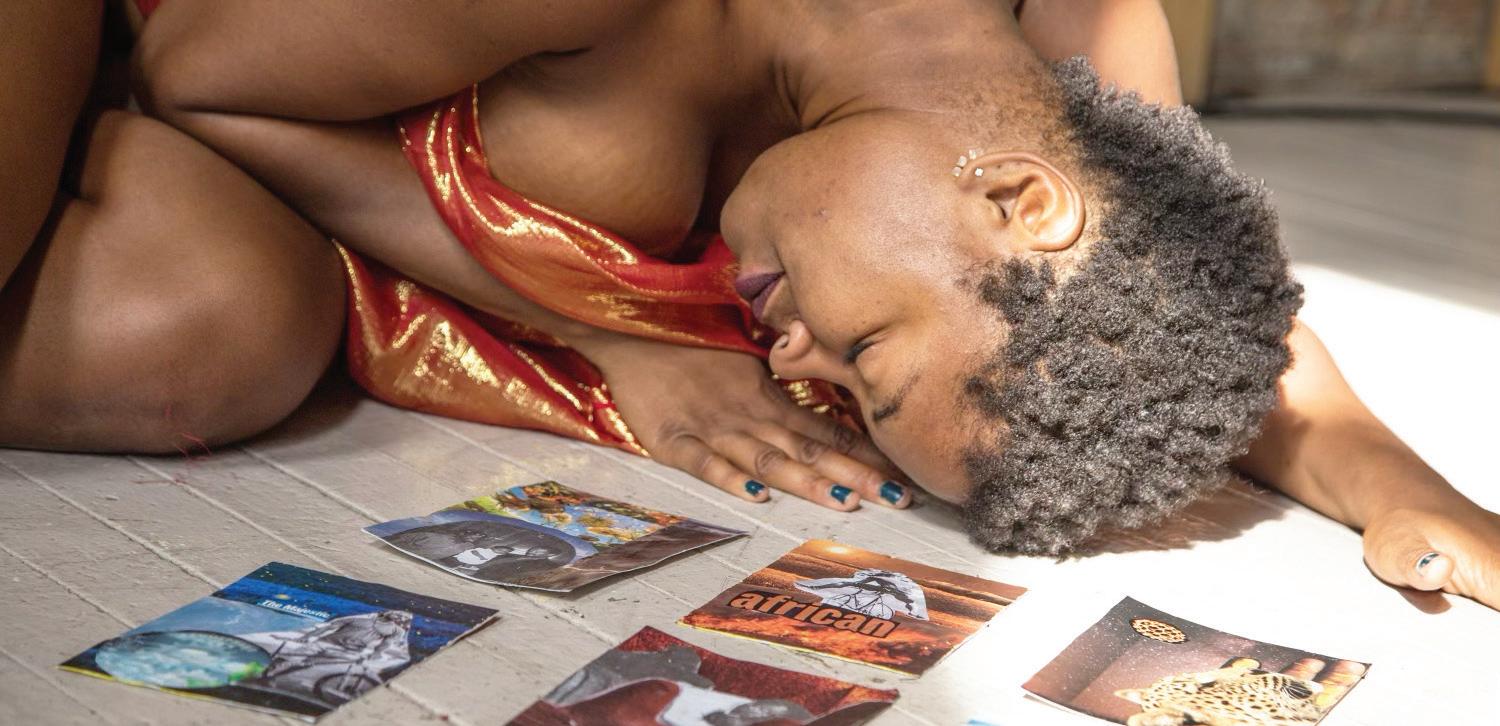
When Petrus began writing “The Stars and the Blackness Between Them” in 2015, it was during the height of the Black Lives Matter movement.
“I was reflecting on how Black victims of police violence were often put on trial, questioning their actions, appearance or behavior, instead of focusing on the systemic violence that led to their deaths.”
A connection to the diaspor Though Petrus grew up in the Midwest, far from her Caribbean roots, her identity remains deeply tied to her
“I had to find a ‘Blackness’ that made sense for me. I’m a firstgeneration Black Minnesotan, so I don’t have the Black Minnesotan heritage or traditional Black American heritage to rely on.” Petrus underscores the significant role Caribbean immigrants have played in shaping the American experience.
“From Marcus Garvey to the influx of Haitians into New Orleans after the Haitian Revolution, or even Malcolm X’s mother being West Indian, there’s a profound connection between Caribbean and Black
■ See LAUREATE on page 5
By Jasmine McBride Associate Editor
innesota Attorney General Keith Ellison and a coalition of 21 state attorneys general have issued a strong rebuke of President Donald Trump’s executive orders targeting law firms and the legal community. The open letter urges lawyers across the nation to “stand together” in defense of the rule of law amid what they describe as unconstitutional attacks on the legal profession and judicial independence.
Trump’s latest actions, the attorneys general argue, amount to political retribution against law firms that have challenged his administration’s policies. Five recent executive orders take direct aim at legal entities, alleging they have “weaponized the judicial process” against the president. These orders revoke government contracts, strip attorneys of security clearances, and limit their access to federal buildings, including courthouses.
In a striking move, one order calls for investigations into law firms with diversity, equity and inclusion (DEI) initiatives, an action the attorneys general strongly denounce. The coalition warns that Trump’s targeting of attor
neys and firms represents
precedented attack on the inde
pendence of the legal profession.

By Jasmine McBride Associate Editor
The founder and long-time leader of Harvest Best Academy Charter School in North Minneapolis, Eric Mahmoud, has been removed from his position by the school’s board of directors following a second lawsuit alleging sexual abuse at the school.
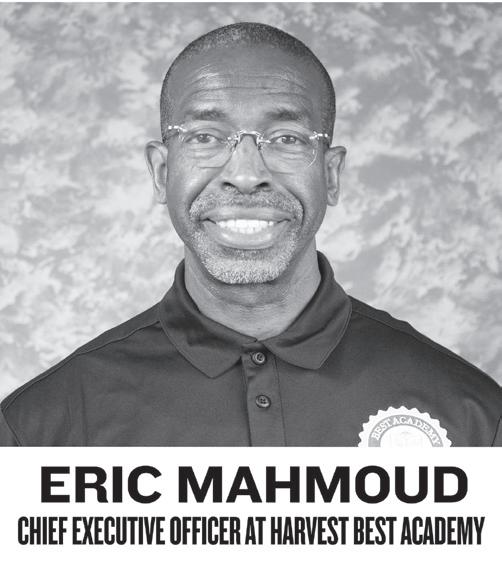
The legal complaint, filed the week of March 20, accuses Mahmoud and other school leaders of turning a blind eye to repeated warnings about former teacher Abdul Wright, who was honored as Minnesota Teacher of the Year in 2016. According to the lawsuit, Mahmoud failed to act despite complaints from staff and parents about Wright’s inappropriate conduct.
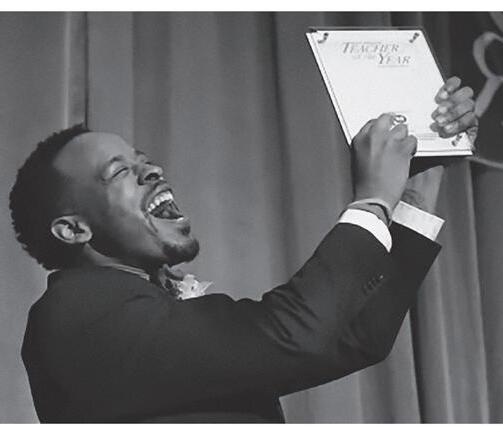

In response, the board voted Friday to end Mahmoud’s more than three-decade tenure at the helm of the institution. Board Chair Ezra Hyland expressed that the decision, though difficult, was necessary for the future of the school. “Eric has made significant contributions, and we recognize his decades of service,” Hyland said in a statement. “However, it is time for new leadership to guide the school forward.”
“Yesterday, we said it was a time for reckoning,” said Jeff Anderson, whose law firm is recognized for representing victims of childhood sexual abuse. “Today, there is a reckoning and real accountability. Best Academy is now a safer place for children.”
“It is time for new leadership to guide the school forward.”
“The voices of the survivors and their families have been heard,” said attorney Molly Burke. “They can take comfort knowing that their courage has led to this change and that children are safer today than they were yesterday.”
Background
Approximately March 20, a lawsuit was filed against Harvest Best Academy and Abdul Wright, a former teacher and winner of 2016’s Award for Minnesota Teacher of the
Year. The lawsuit in question was filed by a former student, identified in court documents as “Doe 605,” who alleges that Mahmoud and other administrators were aware of inappropriate behavior by Wright but failed to report it or take necessary action.
“Wright, 38, was criminally charged in August for allegedly sexually assaulting a former student between March and September 2017 when the victim was 14 and 15 years old. He denies the charges and is scheduled for a trial in June.
Aaron Hjermstad, who was a coach and teacher at Harvest Best Academy, is currently serving a 12year sentence for his sexual abuse of four boys. Before sentencing, Hjermstad fled Minnesota and was arrested in Idaho with several electronic items and thousands of videos of Hjermstad assaulting children between 2013 to 2021.
Stemming from the videos, Hjermstad has been indicted on 12 additional counts of
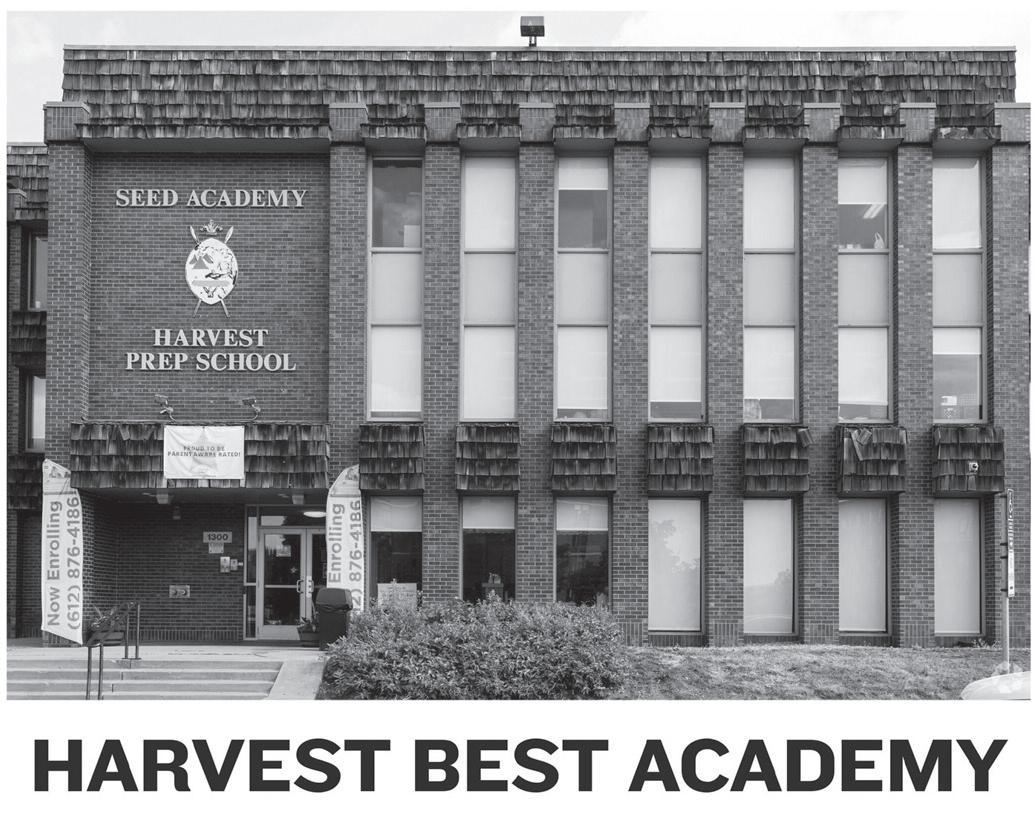
criminal sexual conduct with 12 additional victims.
Mahmoud’s statement
Eric Mahmoud did tell MSR that he would not be going into detail about his removal from Harvest Best Academy and accusations of complicity. Mahmoud did provide a statement reflecting on his years of service and the legacy of the school he founded, detailing his dedication to the Black community and his contributions


to education:
“Hotep Community, after nearly forty years of lifegiving and life-changing work in the Black community, I am writing to share that I will no longer be leading the school I founded and love — Harvest Best Academy.
“I have dedicated my life to this cause, and I have no regrets. Together, we have accomplished incredible things:
• Founding the first African-Centered school in Minnesota
• Launching the first Boysfocused charter school in the state
• Creating an institution that became the largest Black-led employer in Minnesota
• Recognizing the school as one of the top in the nation for educating Black boys
• Contributing over $1.5 million to families during the COVID crisis
• Providing groundbreak-
ing education through our Mobile Innovation Lab, ‘The Beast’
• Helping thousands of Black children graduate college-ready
• Establishing Wakanda Virtual Academy, a leading hybrid school.
“These achievements were made possible by our dedicated staff, and while I am stepping down, the team that built this legacy will continue.”
Jeff Anderson, the attorney representing the plaintiff, criticized the school’s leadership for enabling such behavior. “For years, Mahmoud and his staff protected offenders instead of the children they were supposed to serve,” Anderson said. “This is a reckoning for the Harvest Best community, and it’s time for accountability.”
In the wake of this lawsuit, the Harvest Best Academy administration has expressed its commitment to reviewing the claims carefully and ensuring the safety and wellbeing of all its students. The legal team is currently assessing the next steps as the case progresses.
As Harvest Best moves forward, the focus will remain on addressing the legal challenges at hand, the future of the school, and ensuring changes in policy and leadership.
Jasmine McBride welcomes reader responses at jmcbride@ spokesman-recorder.com.


Sponsored by

By Clint Combs Staff Writer
Minnesota is grappling with stark racial disparities in opioid overdose deaths. Indigenous Minnesotans are 15 times more likely to die from opioid overdoses than white Minnesotans, and Black Minnesotans face a death rate from fatal opioid overdoses three times higher than that of their white counterparts.
These statistics paint a troubling picture of the opioid epidemic’s disproportionate impact on communities of color, underscoring the need for a reevaluation of how addiction and overdose deaths are addressed in health care.
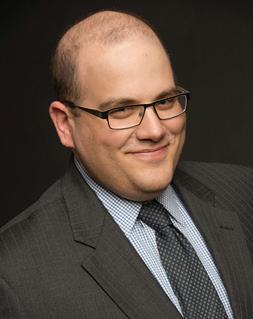
China to Russia to the United States, but the severity of the illness is affected by social factors.
“In Minnesota, we are one of the worst states when it comes to racial disparity in overdose deaths from opioids,” Dr. Levy said. “This makes Minnesota one of the worst in terms of racial disparity.”
and a racial health equity advocate, highlighted the critical role of anti-racist praxis in addressing the opioid crisis.
similar across racial and ethnic groups, highlighting the racial bias in how the opioid epidemic has been handled.
Dr. Robert Levy, an MD (Doctor of Medicine) certified in addiction medicine and family medicine at the University of Minnesota, has seen these disparities firsthand in his clinical work. Dr. Levy emphasized the urgent need for more equitable health care responses to the crisis.
“The prevalence of addiction is about the same across all races,” Dr. Levy said. “It doesn’t differ significantly from Iran to

Dr. Levy, who has spent much of his career practicing in North Minneapolis, shared the personal toll these disparities have taken. “It’s been my absolute privilege to work in the Black community in North Minneapolis, and I’m devastated by these numbers,” he said. “I’ve been working my whole medical career to try to improve them, and they’re only getting worse.”
He highlighted the critical role of social determinants of health, such as access to healthy food, timely medical care, and safe housing, in contributing to these disparities. “It’s the same reason why Covid-19 deaths were disproportionately high among African Americans in Minnesota. These issues don’t exist in isolation,” Dr. Levy explained. Conversations about racial disparities in opioid treatment aren’t new, including in the American Medical Association podcast “Reframing the Opioid Epidemic: Anti-Racist Praxis, Racial Health Inequities, and Harm Reduction.” During the podcast, Dr. Jessica Isom, a psychiatry clinical instructor at the Yale School of Medicine

“The drug use itself doesn’t discriminate, but our policies do,” Dr. Isom said.
“The
“That’s why we need to reframe the way we think about addiction and the communities it affects. We must confront the historical and ongoing impact of these racialized policies if we are to make meaningful progress.”
prioritizes saving lives, particularly for communities like Black and Indigenous populations who face not just addiction but systemic stigma and fear of seeking help.”
For those in Minnesota seeking harm reduction and opioid addiction services, a variety of community-based resources are available. Services include syringe access programs, health screenings, harm reduction supplies, and support for opioid use disorder.
Dr. Isom spoke candidly about the historical roots of racial disparities in drug policy and addiction treatment. “Policies like the Harrison Narcotics Act in the 1930s, and later, the War on Drugs and the Anti-Drug Abuse Act of 1986, were partially shaped by racial stereotypes,” Dr. Isom said.
“There was a deliberate association of racially minoritized groups with unfavorable characteristics — such as the threat to white women and children — that led to punitive policies targeting these communities. These policies continue to influence how we view and treat addiction today.”
She emphasized that despite these targeted policies, drug use rates are remarkably
Dr. Ayana Jordan, assistant professor at Yale School of Medicine, also spoke on the podcast about the importance of harm reduction strategies in combating the opioid epidemic. “Harm reduction meets people where they are,” Dr. Jordan said. “It’s about offering non-judgmental care that
Find a full calendar of available services across the state at “Syringe Services Program Network Calendar, https://www. health.state.mn.us/people/ syringe/calendar.html. For example, the Twin Cities Recovery Project also has NA Meetings on Sundays, 10:30 am - noon, at 3400 East Lake Street, Suite 100, Minneapolis.
Clint Combs welcomes reader responses at ccombs@spokesman-recorder.com.


By Kiara Williams Staff Writer
Kinshasha Kambui’s journey to healing is both a calling and a necessity, one shaped by personal trauma, historical exploration, and a profound awakening that led her to redefine wellness for herself and her community.
Her path began with a lifealtering encounter with the Minneapolis Police Department, followed by years of physical and emotional healing. Over time, her quest for healing became a deep connection to ancestral wisdom, ultimately leading to the creation of Wellness Paradigm — a sanctuary where Black people can experience holistic wellness free from judgment or exclusion.
More than just a wellness center, Kambui sees the Wellness Paradigm as a sanctuary — an oasis where clients are greeted with joy, treated with dignity, and provided the highest level of care, simply because “they deserve it.” The center offers a variety of healing services, including massage therapy, colonics, and wellness consultations, all tailored to meet the specific needs of the Black community.
From the ages of 14 to 17 she was in and out of hospitals, enduring not only physical pain but also the emotional toll of being failed by a health care system that she felt didn’t fully value her. “When I was
17, I was leaving the hospital, and a voice said, ‘You have a choice now. You can either go with these guys, or you can go with nature. Which do you choose?’” she recalled. This pivotal moment marked the beginning of her conscious decision to reclaim her own wellness.
Kambui’s time in the hospital also exposed her to the racism embedded within the health care system. “I didn’t know that they could be racist in hospitals, but I found very quickly that the survival skills we need out here are just as necessary there,” she said.
Her experiences revealed the power dynamics at play, where even something as simple as kindness could be weaponized by medical professionals. Her choice to “go with nature” was not just about physical healing but also about reclaiming her autonomy and understanding that healing comes from within.
As an adult, in 1989 Kambui, along with a colleague, launched “Health Notes: From the Hearts of a Natural Woman,” a community radio show that has now endured for over 30 years. At a time when Black health voices were few and far between, Health Notes offered critical information, emphasizing that Black people deserved access to holistic wellness knowledge.
The show became a beacon of empowerment, affirming


the importance of Black wellness in a society where health information for marginalized communities was often scarce.
As Kambui approached the end of her undergraduate studies in African history and political science at the University of Minnesota, she moved to New York City to complete her degree. There, she spent six months immersed in the archives at the Schomburg Library, working on a 100-book annotated bibliography about African women.
But it was outside the library, at the corner of 125th Street and Lenox Avenue, that she had a transformative encounter. She discovered the Tree of Life, an urban bookstore that served as a hub for healers, herbalists and educators. This space became her second home, and it was there that she began to reclaim her ancestral wisdom and learn from those who had long practiced holistic healing.
Leaving New York, Kambui continued her journey south, where she discovered bodywork and massage therapy. Before ever taking a formal class, she says she instinctively understood how to listen to the body and provide healing touch.
When she eventually pursued training, it confirmed what she already knew in her bones. Her understanding of healing was not just intellectual but deeply intuitive.
Kambui’s path also led her to work for the mayor of Minneapolis from 2002 to 2006, where the stresses of that en-

vironment led her to explore colon hydrotherapy as a form of self-care. It proved to be beneficial, and Kambui soon became a certified colon hydrotherapist.
This practice became another tool in her healing arsenal, one that she integrated into her broader wellness mission, which aimed to offer people the opportunity to care for their bodies and spirits in ways that were often overlooked by mainstream health care.
For more than 15 years, Kambui offered healing services in spaces run by others, often where she and her Black clients were not fully welcomed. The need for a safe, affirming space became pain-
fully clear, especially after the murder of George Floyd. Activists and community members, deeply involved in social
“Wellness in our community is like racism in our community. We don’t talk about it.”
justice work, sought healing through massage, colonics, and wellness consultations.
Yet, many of the predominantly white-owned spaces Kambui worked in were unprepared to meet the unique needs of Black clients, with subtle and overt racism imped
ing the healing process. Kambui realized that true healing could not take place in environments where Black people did not feel safe or valued.
Determined to create a space where Black people could access holistic healing without fear of exclusion or judgment, Kambui, alongside her niece Sidiswa Georgiadas, founded Wellness Paradigm. She emphasizes, “Wellness in our community is like racism in our community. We don’t talk about it. We tend to think that you took a hit there, and oftentimes folks will say, ‘What’s the matter with you? You’re supposed to be able to take that.’” She recognizes that this subtle toxicity is often absorbed without acknowledgment, creating an environment ripe for illness, which is not merely physical but emotional, mental and spiritual.
Kambui’s journey underscores the importance of healing that respects Black people’s worth, fosters self-love, and addresses the complex layers of systemic oppression. She understands that true healing can only occur in spaces where people are seen and affirmed for who they are. Wellness Paradigm is one such space — where Black people can reclaim their wellness, embrace their heritage, and heal in a community that values them for who they are, inside and out.
Kiara Williams welcomes reader responses at kwilliams@ spokesman-recorder.com.


Continued from page 1
When MSR published the article in February, the publication reached out to 180 Degrees, the organization responsible for operating Clifton House. In an interview with executive leaders Dan Pfarr (CEO) and Richard Coffey (COO), they downplayed Crump’s complaints. They explained that Clifton House, a longtime reentry program, was undergoing a $5 million renovation during Crump’s transition, suggesting that he was simply dissatisfied with the process.
Pfarr acknowledged past facility issues but highlighted recent improvements such as a new kitchen, updated bath-
Continued from page 1
American histories.”
Her work delves into themes of migration, cultural identity, and the spiritual bond between Black people and the land.
“Black people in the Caribbean and the South have always had strong ties to agriculture and nature — whether through forced labor or a deeper connection with the land.”
rooms, and enhanced security measures. These changes were exhibited to MSR during the visit, which also featured a table laden with groceries — an occurrence Crump noted as rare. However, Crump called the interview process a “coverup.” In a call from prison he said, “The way they handled the whole interview thing was weird. The two you spoke to [Dan Pfarr and Richard Coffey] are never even at Clifton House.”
vide a clear reason for Crump’s work release termination.
“They [Clifton House leadership] said he violated his policy or whatever, but they never specified exactly what the violation was,” she said. Sullivan admitted that when she saw Crump’s article, “I was afraid of what was going to happen to him…that they were going to find some way, somehow, to get him back,” she said.
Sullivan also confirmed
“Inmates on work leave have a right to due process.”
MSR was able to speak with Gina Sullivan, a Clifton House employee who corroborated Crump’s claims. Sullivan said that a week passed before anyone at Clifton House could pro-
some of the grievances Crump had voiced. “What Willie is saying, unfortunately, is the truth,” she stated. She described one example, claiming Clifton House residents were
left to eat dry cereal from cups due to low food inventory and a lack of proper utensils.
Sullivan says she expressed her frustrations with the management’s priorities, but faced repercussions. “They took me off of work for three weekend shifts without pay...because at this point, I know too much.”
Crump had also attempted to voice his concerns about these issues to the DOC, writing letters to the department in an effort to address the inadequate conditions at Clifton House. However, Crump claimed that his letters went unaddressed and were eventually returned.
MSR contacted Commissioner Paul Schnell, who confirmed receiving Crump’s letters. When asked why the letters were sent back, he said it was “not appropriate
for me to get involved, due to due process.” Asked about the justification for terminating an inmate’s work leave, Commissioner Schnell said, “It’s usually for multiple instances.”
Mark Hanson, Crump’s former supervisor at Better Futures Minnesota during his transition at Clifton House, emphasized Crump’s likeability. “Willie was a great employee… He always did what he was told, and always had a really positive attitude. We never had any issues,” said Hanson.
David Boehnke, a member of the Incarcerated Workers Committee, also echoed a positive experience with Crump. He says the outcome of Crump being sent back to prison isn’t a reflection on him, but a larger system at hand.
“There’s a lot of things that
are wrong with the criminal justice system, and a lot of people who are stuck in these systems are pretty afraid to talk about what’s going on because of retaliation,” Boehnke said. “Willie is not trying to be retaliated against, but he’s willing to say what needs to be said — or to report what’s going on so that other people can learn about what’s happening — and so those conditions can change.”
Currently, attorney Michael McLaughlin is continuing to work on Crump’s case, seeking justice for what he believes to be a violation of due process and retaliation against his client for speaking out about the conditions at Clifton House.
Jasmine McBride welcomes reader responses at jmcbride@ spokesman-recorder.com.
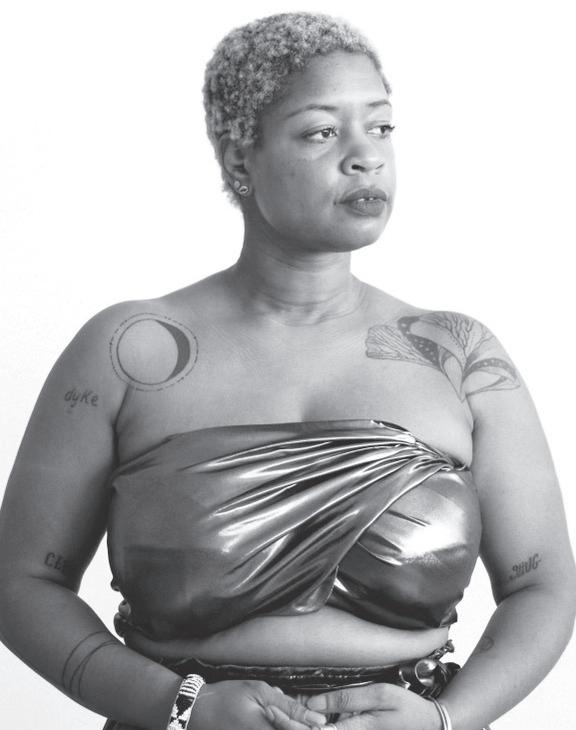
Advice to aspiring writers Petrus is acutely aware of the challenges young writers face, especially in spaces that may not feel inclusive. “Even if a space claims to welcome everyone, if it centers whiteness
Continued from page 1
so they can overcome the challenges that many have yet to recognize.”
Mujasi Jaara Bandele, cofounder of Black Family Blueprint, underscores the importance of addressing generational trauma in parenting. “One of the biggest issues we see is that many Black parents are conditioned to discipline their children through fear and control, often because they themselves were subjected to corporal punishment growing up,” he said. “Our goal is to help parents replace these harmful practices with more compassionate, developmentally appropriate methods that still uphold respect and authority.”
The program’s impact is evident in the stories of families who have seen tangible improvements. A mother who participated in the “Parenting Against White Supremacy” curriculum shared that she stopped using corporal punishment on her two young sons, adopting gentler, more
Continued from page 1
the impeachment of judges in response to rulings contrary to positions his administration has advanced.”
Attorney General Ellison underscored the significance of these developments, calling them “authoritarian” tactics reminiscent of historical efforts to stifle dissent. “Lawyers are not spectators to the Constitution, we are its agents,” Ellison said.
thoughtful disciplinary methods. This shift in approach led to a stronger relationship with her children and positive changes in their behavior and emotional well-being.
Mujasi Jaara Bandele explains the importance of developmental understanding in parenting: “When we check ourselves, we teach children to understand if their behavior is appropriate for their developmental stage. Recognizing this allows the parent to respond with developmental understanding, using logical or natural consequences tailored to the child’s needs.”
without de-centering itself, it can make marginalized writers feel uncomfortable or out of place.”
She urges emerging writers to embrace their craft without self-judgment. “I wrote a lot of things I didn’t like when I was younger, but I let myself express whatever came out. Writing as therapy, writing to channel — allow yourself to create freely without criticism.”
Petrus encourages young writers to surround themselves with supportive people who uplift their creativity. “If your circle includes people who are dismissive or nega-
of their success in school and beyond,” said Gevonee Ford, executive director of NdCAD.
Ford emphasizes that when children understand their culture and history, their academic success follows. “It’s important because it helps me understand who I am, who our people are, and what we want to build in our community,” says Ford. “When children understand their history and their place in the world, they are empowered to succeed academically and in life.”
The Sankofa Reading Program, one of NdCAD’s key initiatives, has shown tre-
“We cannot rely solely on systems that were never meant to serve us.”
The Network for the Development of Children of African Descent (NdCAD) shares a similar commitment to the empowerment of Black families, focusing on literacy and the development of a healthy African identity. “Our goal is for our children and families to become self-harmonized, understanding that their identity is a key part
These efforts to stifle dissent are downright authoritarian — and we know from the lessons of history that appeasing authoritarian leaders only leads to more authoritarianism.”
Trump’s executive orders have already had a chilling effect. According to a report by the New York Times, one major law firm — Paul, Weiss, Rifkind, Wharton & Garrison LLP — has conceded to the administration’s demands.
mendous success in helping children connect reading with understanding their cultural heritage. Ford recalls the impact of the program during a recent graduation ceremony:
“One of the students, who struggled to attend any other class, said that the Sankofa Reading Program was the only class she consistently attended.”
boss government.”
Other firms, however, have resisted. Covington & Burling, based in Washington, D.C., has been targeted for its pro bono representation of former special counsel Jack Smith. Trump’s executive order instructs federal agencies to investigate Covington over $140,000 in legal services provided to Smith, framing the support as an act of partisan defiance.
tive, find a new one. Creative people need encouragement, not discouragement.”
She also advocates for seeking constructive feedback in nurturing environments,
sharing with friends. “There are so many ways to share your work today. Whether it’s social media, texting your friends, or posting online, just put it out there.”
“Allow yourself to create freely without criticism.”
noting the importance of encouraging, flow-based critique over hyper-critical evaluations. “Writing should inspire and flow, not be about judgment.”
Legacy and impact
Finally, she urges writers to explore various ways to share their work — be it through open mics, self-publishing, or
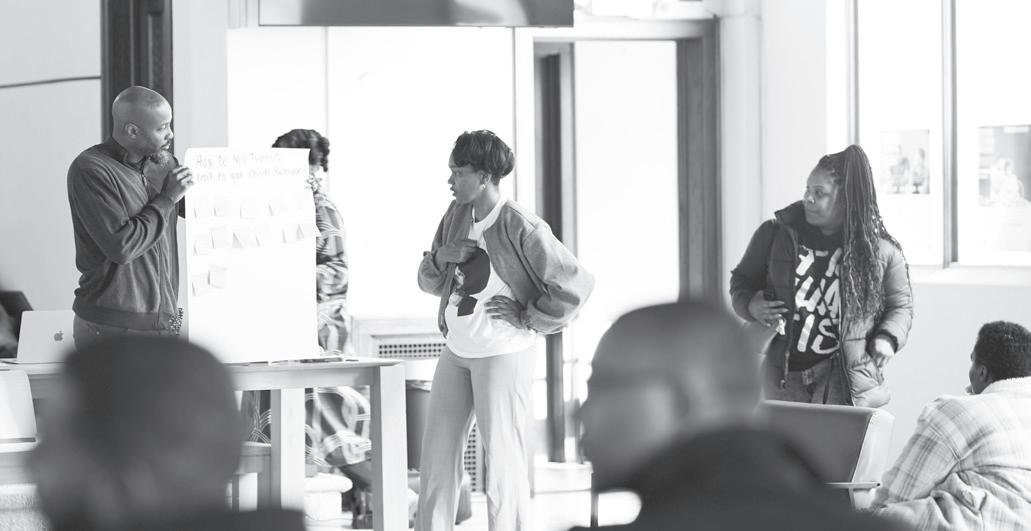
The program not only boosts academic performance, but also fosters a sense of cultural pride, empowering students to embrace their identities.
In addition to working with children, NdCAD provides resources for parents, ensuring they too can support their children’s educational journeys.
“Our companion program, Parent Power Literacy and Advocacy Workshops, helps parents make the same critical connections as their children,” Ford explains.
The work of organizations like Black Family Blueprint and NdCAD is particularly significant in light of President Trump’s push to reduce DEI
order as “an unconstitutional use of taxpayer dollars and government resources to pursue a personal vendetta.”
programs at the federal level.
As his administration continues to challenge the importance of such programs, the need for grassroots initiatives that focus on self-empowerment and Black-led institutions has never been greater.
“We cannot rely solely on systems that were never meant to serve us,” Ayolanda Bandele said. “At Black Family Blueprint, we are teaching our people to build their own resources, support one another, and be leaders in our own communities.”
As the political landscape continues to shift, the focus on mutual aid and self-sufficiency remains vital. In response to
As Minneapolis’ new poet laureate, Petrus is set to continue her mission of amplifying Black and queer voices, fostering creative expression, and building community through the power of storytelling. With her deep roots in artistic activism, her tenure promises to be a source of inspiration for writers, readers, and dreamers alike.
Kiara Williams welcomes reader responses at kwilliams@ spokesman-recorder.com.
In addition to receiving a Coretta Scott King Honor Award for her novel, Petrus’ influence extends beyond her written words. As a champion for emerging Black writers, she provides a model for creativity outside mainstream expectations. Her blending of Caribbean and Midwestern experiences gives voice to often-overlooked identities.
the loss of institutional support, these organizations are providing communities with the tools needed for long-term survival and empowerment. The Black Family Blueprint, for instance, is planning several community events, including one on mental health, to support the emotional well-being of parents and children alike.
Despite the political challenges and the reduction of federal support for DEI programs, organizations like Black Family Blueprint are committed to fostering resilience and empowerment in Black communities. By continuing to provide resources, support and education, these groups are ensuring that Black families are equipped to build a future grounded in equity, healing, and self-sufficiency.
To attend Black Family Blueprints’ educational events, visit blackfamilyblueprint.com. For NdCAD’s literary support and other educational services, visit ndcad.org.
Clint Combs welcomes reader responses at ccombs@spokesman-recorder.com.
tention to the progressive legal community and organizations like the ACLU, the NAACP Legal Defense Fund, and the National Lawyers Guild,” the attorneys general wrote.
The firm agreed to terminate its DEI hiring and promotion practices, pledge political neutrality in client selection, and provide $40 million in legal services to causes Trump supports, including his presidential task force on antisemitism.
Perkins Coie, a Seattlebased firm known for its ties to the Democratic Party, has been similarly targeted. Trump accused the firm of conspiring with billionaire philanthropist George Soros to fund opposition research, including the controversial Steele dossier.
Trump’s crackdown on legal opposition extends beyond law firms. He has escalated attacks on federal judges, demanding the impeachment of District Judge James Boasberg over a ruling that temporarily blocked the deportation of Venezuelan asylum seekers. The Equal Employment Opportunity Commission (EEOC) has also joined the effort, issuing letters to 20 major law firms demanding detailed records of their DEI practices, suggesting they may be in violation of civil rights laws.
“We have been there before with McCarthyism and COINTELPRO, when lawyers on the left were routinely surveilled, cited for contempt of court, and sometimes jailed simply for doing their jobs. We cannot afford to go back.”
The letter concludes with a resolute commitment to defending legal independence:
the face of attempts to attack and intimidate the federal judiciary. We will not allow the rule of law to be undermined. We stand with all our colleagues in the legal community who place the ideals and values of their profession over obedience and silence.”
“The right to pick your own legal counsel is a fundamental constitutional right. My fellow attorneys general and I are urging the legal profession to stand strong against the Trump Administration’s attempts to punish lawyers who challenge its unlawful actions and threats to impeach federal judges who rule on the side of the law.
Legal analysts have widely condemned this as a coercive “shakedown” that sets a dangerous precedent. Sarah Longwell, editor of The Bulwark, characterized the situation as “mob
Perkins Coie has responded with a legal challenge and recently secured a temporary restraining order from District Court Judge Beryl Howell, who criticized the executive
Ellison and his colleagues warn that these actions signal an escalating campaign to undermine legal institutions and intimidate lawyers into silence.
“If Trump succeeds in bringing the nation’s biggest law firms to heel, he may well turn his at-
“As state attorneys general, we have sworn oaths to uphold the Constitution of the United States. Rule of law is the bedrock of everything that makes our country great. We will not allow anyone, including the President, to bully law firms out of representing clients who may be politically disfavored.
“We will not sit by silently in
Joining Attorney General Ellison in the issued letter are Delaware Attorney General Kathy Jennings and Illinois Attorney General Kwame Raoul, who led the coalition, along with attorneys general from Arizona, California, Colorado, Connecticut, the District of Columbia, Hawaii, Massachusetts, Maine, Maryland, Michigan, Nevada, New Jersey, New Mexico, New York, Oregon, Rhode Island, Vermont, and Washington.
Jasmine McBride welcomes reader responses at jmcbride@ spokesman-recorder.com MOB
By Aria Binns-Zager Staff Writer
Minneapolis audiences are in for a magical treat as Tiffany Nicole Greene, a celebrated freelance director, brings her visionary approach to the Children’s Theatre Company’s (CTC) production of “Frozen.” Known for her dynamic storytelling and layered explorations of relationships, Greene is committed to creating a production that resonates with both children and adults alike.
Greene, who has directed acclaimed productions across the country, shared her excitement for the project: “This is one of those great plays that exists at many levels and many layers. It’s very much a story that caters to an adult audience. There’s a lot of material in there — relationship issues and themes that we as adults can relate to.
“At the same time, there are life lessons that are really important for children to access in a safe way. It teaches kids how to cope and how to deal with challenges, and adults need that very same reminder.”
Greene’s approach to “Frozen” at CTC brings a fresh, nuanced perspective while maintaining the grandeur and magic that audiences expect.
“I’m really digging into these relationships,” she explained.
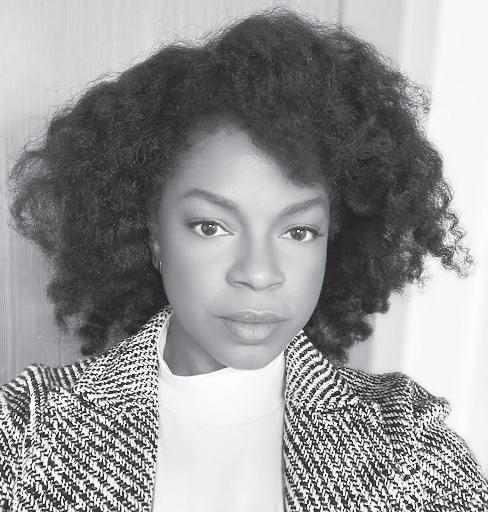
“There’s magic, spectacle, and size — everything that people hope to see when they come to the show. But there’s also real-life drama, a lot of comedy, and deep emotional stakes.
“There’s magic, spectacle, and size. Everything that people hope to see when they come to the show.”

“Elsa’s perspective is a pretty significant shift in our production,” Greene noted. “We explore her moments of strength and what strength looks like on her. We allow space for some rage — because that’s real. That’s what people, including kids, feel.
“My big take is to let it be rough, let it be angular, let it be a little messy at times. Let’s expose all the parts of our humanity so that we can have honest conversations about how we deal with our emotions.”
CTC is renowned for its commitment to inclusivity, and




As the Minnesota Spokesman-Recorder celebrates its 90th Anniversary year, you’re invited to commemorate this historic milestone by donating $90 to celebrate 90 years of continuous publication.
As a “$90—for- 90” contributor (non-business), your name will be prominently displayed in our print and digital editions until the week of Aug. 10, 2025. The paper was founded on Aug. 10, 1934.
For inquiries or to join as a “$90-for-90” supporter, call 612-827-4021, visit our website, or email admin@spokesman-recorder.com.
Anita Alexander
Torrion Amie
Holly Andersen
Richard Anderson
Nancy L. Beals
Jonathan Beck
Clara Boykin & Family
Gretchen Bratvold
Amanda Brinkman
Toweya Brown-Ochs
Benjamin F. Bryant
& Dr. Antusa S. Bryant
Deanna Callender
Shirlee L. Callender
Karl Cambronne
Liam Cavin
Janis Clay
Edward Coblentz Coventry Cowens
Alvin E. Cunningham
Michael Davis
Victoria Davis
Marie Denholm
Michael Diehl
April A. Estes
George Ewing
Elizabeth Fealey
David Fettig
Readus Fletcher
Ken Foxworth
Michael Franks
Lee Friedman
Greene ensures that this production embodies that core value. “I was on the lookout for unique individuals — a diverse group of people to tell this story,” she shared. “I wanted to place pristinely put-together performers right alongside those who are messy oddballs. That’s the beauty of humanity.”
Beyond casting, inclusivity is also reflected in the creative team. “Our costume designer is a Black woman, and that felt important to me,” Greene emphasized. “Diversity isn’t just about what’s on stage; it’s about the voices shaping the production.”
While technical rehearsals were still underway at the
time of the interview, Greene expressed her excitement for the stagecraft that will bring the icy kingdom of Arendelle to life. “I literally have a magic meeting after this call,” she laughed. “We’re still discovering these moments, but one image I’m particularly excited about is how Elsa’s ice palace comes to life on stage. That’s going to be beautiful.”
Having worked on productions like “Hamilton,” Greene brings a wealth of experience to “Frozen.” “I’ve learned how to be a great communicator, a great listener, and how to take things one step at a time,” she said. “If you try to do everything at once, it can feel over-

whelming. But if you have a sturdy vision and chip away at it, you get there.”
For those considering seeing “Frozen,” Greene has one message: “You are going to have a fantastic time. You’ll be caught by both the comedy and the tenderness. Be prepared to cry at moments you didn’t think you would and laugh at moments you didn’t expect.”
But beyond entertainment, she hopes audiences leave with something deeper. “I hope people walk away with a fresh perspective or a reminder to remain curious about those we don’t understand, rather than turning against them. And to open ourselves up more to the people we love — even when we don’t always see eye to eye.”
With “Frozen,” Greene continues to push boundaries, inviting audiences to experience a beloved tale in a new and profoundly human way. The production promises to be a visually stunning, emotionally resonant journey for all.
“Frozen” is an all-age show running April 15 through June 15. Tickets run between $20 and $100. For more information, visit childrenstheater.org.
Aria Binns-Zager welcomes reader responses at abinns@ spokesman-recorder.com.
Ella Gates-Mahmoud
Kimerlie Geraci
Erick Goodlow
Leota Goodney
Walter Greason
Karlene Green
Pamela Hall-Clemens
Charles Hallman
Jeana Hamm
Hendon Group, Inc
Thomas Hill
Maxine & Kieran
Hughes
Ellen Guettler
& Ben Pofahl
Colnese Hendon
Connie Hudson
Angelo Hughes
Andrew Issacson
Katie Izzo
Ms. Jewelean Jackson
& Sir Steven C. Davis
Nina Johnson
Clarence Jones
Debra Jones
Shirley R. Jones
Julie July
Cynthia Kelly & Murry Kelly Jr.
Nathaniel Khaliq
Zena Kocher
Jimmy Lewis
Lisa Lissimore
Michele Livingston
Harlan Luxenberg
MRPP and Associate Communications
Melanie Manaen
Rose McGee
Peter McLaughlin
Jeffrey McVay
Kyle Meerkins
Deborah Montgomery
Debbie Morrison
Marcia Murray
Mary K. Murray Boyd
Dan Ness
Sanda Noy
Amethyst O’Connell
The O’Neill Family
Minister Dr. Ni Ora Hokes
Liz Oppenheimer & Jeanne Burns
Tamara Pollard
Fiona Pradhan
Ray Seville Productions
Mary Quinn McCallum
Dr. Mitchell Palmer McDonald
Heidi Pemberton
Amy Pfankuch
Patty Ploetz
Catherine Pruszynski
Mark Ritchie
Lyn Rabinovitch & John Saxhaug
Augustus Ritemon
Carolyn Roberson
Winthrop & Barbara
Rockwell
M. Rebecca Ross
St. Paul Saints
Anura Si-Asar
Floyd Smaller
Chanda Smith Baker
South Hill Film
Ronald Spika
Stan Sandiford
Cyriaque Sukam
Timothy Sullivan
Heidi Swank
Gregory Tillman
Dotty Timmons
Nicholas Upton
Kelsi Ustipak
Donald
By Jasmine McBride Associate Editor
Minnesota author and entrepreneur Crystal L. Stein captivated young readers and families at the Red Balloon Bookstore in St. Paul on March 22 with a unique multisensory storytelling event. The session featured readings from her “Echoes of Excellence” collection, which highlights historically overlooked composers and artists of color such as Florence Price, George Bridgetower, and Winifred Atwell.
Stein’s innovative approach to literary engagement incorporates music, Braille, and interactive elements, ensuring accessibility and enjoyability for all children, including those who are blind or visually impaired.
Braille, a tactile writing system commonly used by people who are blind or visually impaired, was developed in the early 19th century by Louis Braille, a French educator who lost his sight as a child. The system consists of raised dots arranged in patterns that correspond to letters and numbers, allowing readers to interpret text through touch.
Today, Braille remains a crucial tool for literacy and independence among visually impaired individuals worldwide, making its integration into children’s literature an important step toward inclusive storytelling.

“Do you have a background in music?” said a mother in the crowd, holding her toddler on her lap.
“No, my background is in finance,” giggled Stein, noting that her background in music goes as far as the “grammy
nancial technology to founding Beret Publishing was driven by a profound sense of purpose that surfaced around the time George Floyd was murdered.
Asked about her thoughts around taking that risk, she explained during the event, “I

showers.” A mother of two, Stein says her transition from a lucrative 16-year career in fi-

don’t have any fears because I feel like it’s a calling at this point. I feel grateful to be able to tell their stories... I feel like I’m behind, like I should have done this a long time ago.” Stein’s career shift mirrors a broader trend among Black women in the United States.
According to a J.P. Morgan report, 17% of Black women are in the process of starting a new business, compared to 10% of white women and 15% of white men. Motivations include pursuing a passion and creating new income sources.


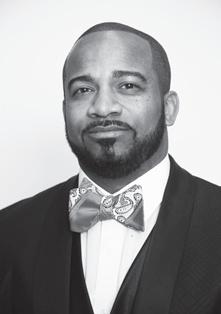
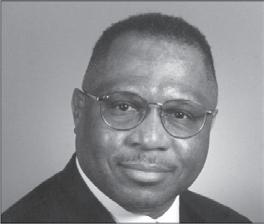

Additionally, Forbes notes a 70% increase in businesses owned by Afro-descendant women in the U.S. over the past four years.
to share it.”
Bridgetower was a biracial violin prodigy of African and European descent. He was born in 1778 and became well known across Europe for his virtuosity. Beethoven was so impressed with Bridgetower’s playing that he composed a violin sonata specifically for him — what is now known as the “Kreutzer Sonata” (Violin Sonata No. 9 in A major, Op. 47).
Originally, Beethoven dedicated the piece to Bridgetower, and the two even performed it together in 1803, with Bridgetower sight-reading the difficult violin part. However, after a personal dispute, Beethoven later changed the dedication to another violinist, Rodolphe Kreutzer, who ironically never played the piece and considered it too difficult.
children can feel reflected, no matter the gender, utilizing the stories of underrepresented heritage in an educational and creatively inspirational way.
Looking ahead, Stein plans to expand Beret Publishing’s offerings. “Next year, I’ll actually be all set up to put on other authors as well, which I’m very excited about,” she shared. Future projects include a new collection spotlighting other individuals deserving recognition, cartoons to engage children through visual storytelling, and Beret Music, a repository of significant compositions to educate and inspire young audiences. Stein emphasizes the importance of focus on our “calling” amidst societal challenges. “We need to observe, not absorb,” she advised. “Even in the climate that we’re in right now...what matters is that we have work to do. So that’s the focus, and that’s what we’re going to continue to do.”
Stein’s dedication to representation aligns with evolving trends in children’s literature.
The Cooperative Children’s Book Center (CCBC) reported that in 2022, 13% of children’s books had at least one Black creator, and 40% had a BIPOC (Black, Indigenous, and People of Color) creator. This marks a significant increase from previous years, reflecting a growing demand for diverse narratives.
However, challenges remain. A study highlighted by “Medium” revealed that in 2017, only 4% of children’s books featured a Black main character, indicating that while progress has been made, there is still work to be done to ensure equitable representation in children’s literature.
“Most people have heard of Beethoven,” said Stein, “but how many have heard of George Bridgetower? His legacy deserves recognition, amongst others, and I’m happy
Despite the erasure of Bridgetower’s name from the sonata, his influence remains a significant historical example of the contributions of Black musicians to classical music. When it comes to Stein’s books, each subject is illustrated in a way whereby Black
Families and educators interested in exploring Stein’s work can find more information on Instagram, TikTok, YouTube, or at www.beret publishing.com.
Jasmine McBride welcomes reader responses at jmcbride@ spokesman-recorder.com.




By Stacy M. Brown
Black Americans have survived what no other group in the United States has had to endure — a targeted, generational campaign of systemic injustice that spans slavery to the present day. The historic African American experience includes Black Codes, convict leasing, Jim Crow, redlining, sundown towns, COINTELPRO, mass incarceration, and the calculated destruction of over 60 thriving Black towns.
The pain is historical, but the oppression is ongoing.
A striking image circulating on social media drives home this point. It lists horrors that Black communities have endured: the assassination of Black leaders, CIA-linked crack cocaine flooding neighborhoods, police lynchings, denial of GI Bill benefits, FHA loan exclusion, media demonization, and the theft of land from Black farmers. The post ends with a haunting question: “And you still ask why we’re not ‘equal’?”
the new curse word.
In addition, for many Trump supporters and members of the GOP, the word “woke” has taken on the weight of the N-word — weaponized to silence and shame those who demand equality.
Trump has repeatedly mocked the idea of anti-racism, attacking education and corporate programs that seek to rectify centuries of bias. Under his influence, state governments have banned discussions of race, critical race theory, and Black history from classrooms. And that war on memory has now moved from the classroom to the cemetery.
In one of the most chilling moves to date, the Trump administration has purged Black military legends from the Department of Defense website and Arlington National Cemetery tributes. These weren’t just names. They were patriots who served a country that too often failed to serve them.
stolen or taken through discriminatory USDA practices — losses that ripple through generations.
Meanwhile, Trump and many in his party continue to peddle dangerous racial tropes. His rallies are filled with dog whistles and overt calls to “take our country back.” Cities with high Black populations are routinely labeled “crime-ridden” and “lost.” News outlets that challenge these narratives are dismissed as biased, and those who speak out are told to “go back” where they came from.
It’s not just rhetoric — it’s a strategy, one that seeks to delegitimize Black pain, erase Black history, and destroy the tools designed to close racial gaps.
The question isn’t why Black people aren’t “equal.” It’s why this country is still doing everything in its power to make sure they never are.
The Rev. Dr. Martin Luther King Jr. once warned that “the arc of the moral universe is long,
By Mark P. Fancher
The latest iteration of Black othering is found in the concept of “Foundational Black Americans.” A website dedicated to this idea explains: “It is important to clarify that Foundational Black Americans (FBA) is not a group or an organization, and there is no designated leader of FBA.
“FBA is a lineage-based designation that specifically refers to the over 43 million Black Americans who are direct descendants of the Freedmen — the formerly enslaved Black people who were emancipated in the United States. This lineage represents a unique and unbroken connection to the foundational builders of this nation.”
Those who subscribe to this concept believe it is important to distinguish so-called Foundational Black Americans from those born in Africa and other people of African descent whose ancestors were never enslaved in the U.S. This perspective resembles the MAGA program not only in its othering of immigrants, but also in the convenient disregard of facts, and reliance on comforting self-delusion, all of which is ultimately self-defeating.
So-called Foundational Black Americans may tell themselves they are noble protectors of ancestral legacy, but they are in fact little dif-
ferent from European groups in this country that conceptualized white privilege and tried to reserve it for exclusive groups. In the case of Foundational Black Americans and the so-called “American Descendants of Slaves” who preceded them, there is a belief — sometimes stated, sometimes not — that there is only a small slice of the American pie that is potentially available to Black people, and it is terribly unfair that those who are relatively recent arrivals in this country will share in that slice to the exclusion of people whose families have been here since the slavery era.
those whose ancestors were enslaved in the U.S. What then are we to say about Marcus Garvey, Harry Belafonte, Kwame Ture (Stokely Carmichael), C.L.R. James, Louis Farrakhan, Ivan Van Sertima, Cicely Tyson, Shirley Chisholm, and many more?
Despite this irrefutable record of injustice, the Trump administration and its allies have not only refused to reckon with the truth — they’ve launched a full-fledged assault on any progress toward justice.
Many Foundational Black Americans also believe that reparations paid by the U.S. government should not be paid to those whose ancestors were not held in bondage in the U.S. After all, it is the Foundational Black Americans who are the “foundational builders of this nation.”
But therein is a flagrant untruth. Implicit in the statement is the suggestion that meaningful contributions to the struggle for liberation and justice have been made solely by

Also, the idea that slavery in the U.S. was a discrete enterprise limited to this country’s boundaries ignores historical facts documented so well in Eric Williams’ book “Capitalism & Slavery” about the global operations of the slave trade, and that the culprits responsible for those held in bondage in the Caribbean and Latin America are also culpable for the plight of those enslaved in the U.S., and vice-versa.
In other words, when it comes to slavery, the circumstances of all Africans are indivisible. This includes Africans who were never taken from Africa, because they were left to cope with the devastation that was the consequence of the slave trade’s massive depopulation of a continent and the destabilization of African societies.
Hoping only for a slice of the American pie not only limits the vision of what is possible for the African world, but it also takes the ideas of liberation and self-determination off the table. Why settle for a slice of the American pie when it is possible to enlist all people of African ancestry in a global fight to purge Africa of all foreign exploiters and then unite the entire continent under a single flag.
That flag could fly over a unified socialist economy and through its sheer size and might guarantee the protection and prosperity of not only Black communities throughout the world, but also solidarity and material support for oppressed people everywhere who are fighting to escape the clutches of imperialism.
This is a portion of LA Progressive’s “The Folly So-Called Foundational Black Americans. To read more, visit laprogressive.com. Mark P. Fancher is an attorney and writer. He can be contacted at mfancher@comcast.net.
Once considered essential to workplace fairness and civic equity, diversity, equity and inclusion (DEI) has now been made into a political target. In Trump’s rhetoric and in his policies, DEI is no longer a path forward but a so-called threat to traditional America. The term has been villainized to the point where, for many on the right, it’s become
Their erasure is not coincidental — it’s ideological. It signals a return to a sanitized version of American history where Black contributions are omitted and white supremacy is coddled.
And while the erasure is symbolic, the policy consequences are all too real. Black veterans were denied GI Bill benefits after World War II, cutting off access to the middle class. Black families continue to be denied home loans at far higher rates than white families. Black farmers have had millions of acres
but it bends toward justice.” But in Trump’s America, that arc is being yanked backward — pulled by those who see equality not as a goal, but as a threat.
And as the social media post so painfully reminds us, until this country confronts its past — and stops repeating it — equality will remain a promise still denied.
The post “BROWN: Why We’re Not Equal — A Painful American Truth Black Communities Still Endure” appeared first on The Washington Informer.
By Julianne Malveaux
After he won the Nevada Republican caucuses in 2016, the current President crowed his victory. “We won with young. We won with old. We won with highly educated. We won with poorly educated. I love the poorly educated.”
Congressman Bobby Scott (D-VA) reflected on this comment as he asked Republicans to join Democrats in preserving the Department of Education.
The 47th President loves the poorly educated because he knows how to manipulate them, and because the less you know the more you can be persuaded by false rhetoric.
The cuts in education, including cuts in educational services for the differently abled, both physically and intellectually, will likely have a long-term deleterious effect on the condition of education in our country. The President’s reason for cutting the Department of Education is poor test scores; but the first phase of cuts, separating at least 1,300 workers from their jobs, will also likely reduce the amount of educational data that is available.
So, we may not learn, from the Survey of Doctorate Recipients (SDR), which academic areas we need to boost. We are not able to follow graduates over time to analyze career trends. Fewer employees collecting data may impact data accuracy.
Given this President’s antiDEI stance, we may not measure achievement gaps appropriately. Many of my research colleagues are concerned that this anti-detail-oriented Presi-
dent and his motley crew of incompetents prefer aggregate numbers to disaggregated ones. That means they may continue to report an overall unemployment rate, but fail to report changes in Black, Latino and Asian unemployment.
Data collection costs money, and the President aims to cut budgets. That includes more than $600 million in grants, many of which go to benefit the “least and the left out.” Further, many are concerned that the Office of Civil Rights has reduced effectiveness because of staff cuts.
The Office of Civil Rights lost at least 240 employees, including 180 staff attorneys. Regional offices have been closed, making it more difficult for people to file civil rights complaints.
People aren’t taking this action lying down. The National Education Association (NEA), the NAACP, and the American Federation of Teachers (AFT) are all suing the Department of Education to prevent its closure. According to the NEA, “If the Education Department is broken apart, the rights of students, particularly our most vulnerable, to an education that imparts academic lessons, civil rights protections, and prepares them for their future, will be undercut.”
In addition, with fewer workers’ protections and an indifference to safety net supports, people will be forced into low wage work instead of workforce development activities that will better prepare them for good jobs in the future.
This president loves the poorly educated because they are most easily exploited. We are headed into a dystopian
nightmare unless Democrats are willing to take some action. This President and his allies, assisted by a woman who used to lead Worldwide Wrestling (great preparation to lead the Department of Education), will reorganize or eliminate many critical functions of the Department of Education. Our young people will be the ones to pay.
This year 3.9 million young people are slated to graduate from high school. About 62% of them will enroll in either twoor four-year colleges. What will the atmosphere be like on campuses this fall? Unless some of the lawsuits are successful, lower-income students, differently-abled students, and those in need of extra services will be sidelined.
DEI programs that offer counseling and solace to some students are likely to be dismantled. Tens of thousands of students, if not millions, will be disadvantaged by the way the Department of Education is being transformed into the Department of MisEducation. This is the era of the MisEducation of the Marginalized.
Scrubbing our history books of references to Black, brown, and other patriots is just a first step to dismantling any notion of critical thinking. This current President and his minions are dedicated to ignorance; and indeed they love the “poorly educated.”
What does this mean for our nation’s future?
Dr. Julianne Malveaux is a DC-based economist and author. For more information, visit, Juliannemalveaux.com.
From Ads Department/MN Spokesman-Recorder
PHONE: 612-827-4021
FOR BILLING INQUIRIES & TEARSHEETS
Metro Social Services, Inc. seeks a Business Operations Analyst to work at its St. Paul, MN location to evaluate policies, procedures & functions using statistical analysis, address business issues, write memos & develop business practices. Bachelor’s in business operations, administration or a related field & 3 years’ experience required. Submit resume to Sunday Olayinka, Director of Operations, 345 University Ave W, St. Paul, MN 55103, or at solayinka@metrosocialservices.org or visit https://www. metrosocialservices.org/
PLEASE CONTACT
ACCOUNTING DEPT @ BILLING@SPOKESMAN-RECORDER.COM
651-493-0426 jeremy@aaronfergusonlaw.com
SIGNED BY: Latonia Simmonds MAILING ADDRESS: None Provided EMAIL ADDRESS FOR OFFICIAL NOTES: Latonia@tlcprecision.com Minnesota Spokesman-Recorder April 3 10 2025
10
conference tournament crowns in four tries, and a 60-plus winning percentage both in league and overall. He finished his 10th and final season with a programbest 30-5, fifth-ranked among the nation’s mid-majors women’s basketball teams.
This historic season that ended in a first-round loss in the NCAAs, the Spartans were led by Minneapolis native Kierra Wheeler, a firstteam all-MEAC and the tournament’s outstanding player in their victory over Howard for the league’s crown, and guard Diamond Johnson, the MEAC’s Player of the Year and first-teamer.
Both are virtually unstoppable, but the former quickly corrected me: “It’s not just me and Diamond on the floor…but my teammates are really good as well,” stressed Wheeler, who last week entered the transfer portal and will play her final year of eligibility elsewhere. “My team is really talented.” Johnson, a senior, deserves a real shot at making a WNBA roster later this spring.
“We have amazing players,” noted the former NSU coach.
“I have a lot of players that could play everywhere in the country.”
Rob Knox of The Next also pointed out, “Norfolk State
can now confidently boast its credentials in any conversation about the greatest Historically Black College and University women’s basketball programs in history.”
Vickers was among five mid-major Black HCs on this year’s Advancement of Blacks in Sports (ABIS) Black coaches watchlist, and as of now he is the only one to successfully leave that list to a Power 4 school. He did his job at Norfolk State and earned the chance to do it elsewhere.
“As far as the mid-major publications, they always list me as one of the best coaches in the country,” said Vickers.
Annual historical reminder…
Louisiana Tech defeated Cheyney State 76-62 in the first-ever NCAA women’s championship on March 28, 1982. It remains the first and only HBCU to make the Final Four and play for a national title.
Finally…
The WNBA’s Chicago Sky last week made league history of sorts with its all-Black coaching staff: HC Tyler Marsh and assistants Courtney Paris, Tanisha Wright, and Rena Wakama all will be in their first season later this year.
Charles Hallman welcomes reader comments to challman@ spokesman-recorder.com.
Minnesota Spokesman-Recorder April 3, 10,
SUMMONS PREPAID FLAT RATE: $110 X 3 WEEK RUN TOTAL: $330
Please proof, respond with email confirmation to ads@spokesman-recorder.com
Metro Social Services, Inc. seeks a Community Health Program Coordinator to work at its St. Paul, MN location to assess client health needs, develop strategies to improve client & community health, collect & analyze health data, prepare & distribute educational materials & lead awareness & education initiatives. Bachelor’s in health science or related field & 3 years’ experience required. Submit resume to Sunday Olayinka, Director of Operations, 345 University Ave W, St. Paul, MN 55103, or at solayinka@metrosocialservices.org or visit https://www. metrosocialservices.org/
The MSR handles billing digitally. This means you will get e-tears and e-mailed invoices unless you specifically request a hard copy.
Metro Social Services, Inc. seeks a Computer Systems Architect to work at its St. Paul, MN location to understand the systems governing Metro’s operations, assess systems infrastructure, identify needed updates & upgrades, streamline systems architecture, assess & address risk, plan for contingencies, monitor project progress & ensure industry & regulatory compliance. Bachelor’s degree in computer science & 3 years’ experience required. Submit resume to Sunday Olayinka, Director of Operations, 345 University Ave W, St. Paul, MN 55103, or at solayinka@metrosocialservices.org or visit https://www. metrosocialservices.org/
SIZE: 2 COL
Minnesota Spokesman-Recorder April 3, 10, 2025
Metro Social Services, Inc. seeks a Medical Services Coordinator to work at its St. Paul, MN location to manage community outreach events, refer clients to for assistance, identify & address barriers to care & schedule client visits. Bachelor’s in health science or related field & 3 years’ experience required. Submit resume to Sunday Olayinka, Director of Operations, 345 University Ave W, St. Paul, MN 55103, or at solayinka@metrosocialservices.org or visit https://www.metrosocialservices.org/
Minnesota Spokesman-Recorder April 3, 10, 2025
Metro Social Services, Inc. seeks a Computer Systems Administrator to work at its St. Paul, MN location to maintain Metro’s computer networks, improve performance and security, evaluate vulnerabilities, create data redundancies, resolve network & software issues & provide software support, installation, integration & compatibility. Bachelor’s in computer science & 3 years’ experience required. Submit resume to Sunday Olayinka, Director of Operations, 345 University Ave W, St. Paul, MN 55103, or at solayinka@metrosocialservices.org or visit https://www.metrosocialservices.org/
From Ads Department/MN Spokesman-Recorder
PHONE: 612-827-4021 FOR BILLING INQUIRIES & TEARSHEETS
Minnesota Spokesman-Recorder April 3, 10, 2025
PLEASE CONTACT ACCOUNTING DEPT @ BILLING@SPOKESMAN-RECORDER.COM
Principal Therapy Consultant – Structural Heart: Medtronic, Inc., Minneapolis, MN
ASSUMED NAME FLAT RATE: $215 2 WEEK RUN
Req. Master’s degree or foreign equivalent in Sales Mgmt, Marketing, Biomedical Eng, Nursing, or closely rel. field & 5 yrs exp as a sales rep. or rel. occ. for implantable cardiac devices. Or, Bachelor’s & 7 yrs exp. Must be available & willing to serve customers 24/7 for emergent cases. Must work remotely from home office w/in Washington state servicing customers & hospitals w/ in the greater Seattle region, Bellingham, WA, & Anchorage, AK. Must be insurable (car insurance) & have valid driver’s license. Must be able to travel 50%-75% w/in Washington State & Alaska to visit physician customers & hospitals including the greater Seattle region, Bellingham, WA, & Anchorage, AK. Apply at https://medtronic.wd1.myworkdayjobs.com/MedtronicCareers, Req. #R24839. No agencies or phone calls. Medtronic is an equal opportunity employer committed to cultural diversity in the workplace. All individuals are encouraged to apply.
Please Note: New email address for all future ads is ads@spokesman-recorder.com
The MSR handles billing digitally. This means you will get e-tears and e-mailed invoices unless you specifically request a hard copy.
Minnesota Spokesman-Recorder April 3, 10, 2025
SIZE: 2 COL X 2.75”
Metro Social Services, Inc. seeks a Community Counseling & Social Services Program Manager to work at its St. Paul, MN location to oversee its community counseling & social services programs, manage staff caseloads, intakes & assessments, assist with ethical & regulatory compliance & align services with organizational & stakeholder missions. Bachelor’s in guidance, counseling or related field & 3 years’ experience required. Submit resume to Sunday Olayinka, Director of Operations, 345 University Ave W, St. Paul, MN 55103, or at solayinka@metrosocialservices. org or visit https://www.metrosocialservices.org/
Minnesota Spokesman-Recorder April 3, 10, 2025
From Ads Department/MN Spokesman-Recorder
Phone: 612-827-4021
Senior Principal IT Business Systems Analyst: Medtronic, Inc., Mounds View, MN Req. Master’s degree or foreign equiv. in Information Technology, Computer Science or rel. tech. field & 8 yrs as an IT Bus. Systems Analyst or rel. occupation. OR Bachelor’s degree or foreign equiv. in Information Technology, Computer Science or rel. tech. field & 10 yrs as an IT Bus. Systems Analyst or related occupation. Relocation assistance not available for this position. Apply at https://medtronic.wd1.myworkdayjobs.com/MedtronicCareers, Req. #R24811. No agencies or phone calls. Medtronic is an equal opportunity employer committed to cultural diversity in the workplace. All individuals are encouraged to apply.
FOR BILLING INQUIRIES & TEARSHEETS
PLEASE CONTACT
ACCOUNTING DEPT BILLING@SPOKESMAN-RECRDER.COM
Minnesota Spokesman-Recorder April 3, 2025
Minnesota Spokesman-Recorder April 3, 2025
Continued from page 10
American girl [playing]. I’ve seen four African American girls at one time on a squad of eight.”
Sophomore Ahmani Guichard is the only Black player on this year’s UCLA team.
Known also as an excellent recruiter, Brown said, “I’m proud to say there probably have been more African American girls in this program in the last two decades than any other university in the country.”
After our chance meeting and agreeing to a brief interview, Brown reiterated how proud he is as a Bruin coach.
“Being able to walk on a
Continued from page 10
to the Expo don’t fully understand the opportunity to give a coach or two a lasting good impression. “I think there’s a lack of us as a whole in the basketball community of getting them to understand what they’re actually doing it for,”
campus like this,” he concluded, “UCLA is one of the few universities that have five buildings named after African American gentlemen. To be part of this great university, to be part of this great legacy of African American athletes and coaches, I am truly blessed.”
Next week – a diversity showdown of sorts on the Minnesota campus
Sports careers conference
The USA Basketball Foundation has awarded 12 future leaders in sport full scholarships, including travel, hotel accommodations and conference registration fees valued at $3,000 each to attend the April 3 USA Basketball Wom-
he told the MSR. “You should actually absolutely welcome every situation with your best foot forward.
“We have a lot of coaches here who are actually looking for some spots to fill, and not just bench spots,” stressed Jackson. “We invited 80 coaches to be here, and we have 27 that have shown up. We have a good mix from DI JUCO, the
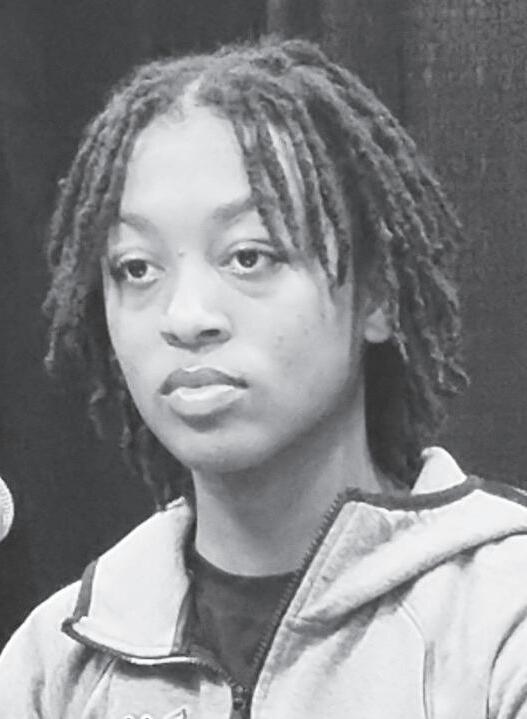
EMPLOYMENT DISPLAY SIZE: 2COL X 3.5 INCH RATE: $44.60 PER COL. INCH
is among the 12 attendees. “I want to work in sports,” she told the MSR at the MEAC tournament last month.
Please proof, respond with email comfirmation to ads@spokesman-recorder.com
The MSR handles billing digitally. This means you will get e-tears and emailed invoices unless you specifically request a hard
Mahogany Cottingham
Photo by Charles Hallman
en in the Game conference at this year’s Women Final Four in Tampa, Florida. Delaware State sophomore Mahogany Cottingham
DIII JUCO [and] the NAIA.” Conover said that although it might be ideal to hold the Senior Expo on a local college campus, “I like it here in North Minneapolis just because of the culture.”
Over 300 women applied for the USA Basketball scholarships, and Cottingham said she wasn’t sure that she would get one of them. “This is a great opportunity,” she said, “and a way to represent my school and our team. I’m excited for it.”
Women in the Game is a professional development conference for high school and college students and young professionals looking or seeking a career in sports.
Charles Hallman welcomes reader comments to challman@ spokesman-recorder.com.
“So, if somebody has all the connections on the girls’ side, I’ll definitely be open to it.”
Charles Hallman welcomes reader comments to challman@ spokesman-recorder.com.
Asked if there are any future plans to hold a similar event for local prep girls basketball players who are similarly in need of exposure to college coaches, “I would be open to doing it,” said Conover. “I want it to be done well. I don’t want it to be chaotic or disorganized.

arry Vickers is the latest example that if you can do it at a Black college, you can ultimately get a chance to do it at a bigger school.
Vickers spent nearly two decades at one HBCU, Norfolk State, first as a player, then a men’s assistant, then interim head women’s coach to full-time, where he created a dynasty.
Unlike what occurred in Gopherland last week, where the new men’s basketball coach was hailed as some conquering hero in his introductory press conference, Vickers and his family also were welcomed at his new school, Auburn, at the same time but not as flashy.

“Throughout the search process, one name continually rose to the top — Larry Vickers,” declared Auburn Athletics Director John Cohen in the press release that announced the former Norfolk State women’s coach’s hiring. “Coach Vickers has an incredible techni-


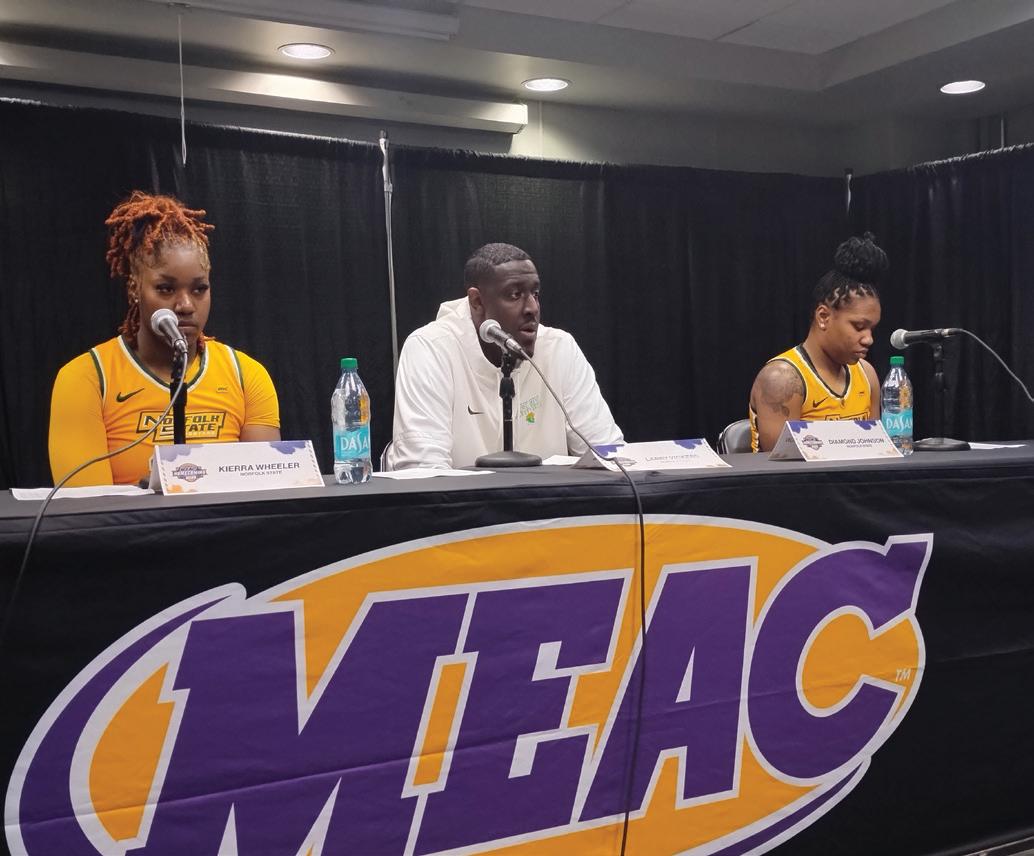
cal understanding of women’s basketball. No one has worked harder for an opportunity like this than Coach Vickers.”
“No one has worked harder for an opportunity like this than Coach Vickers.”
his week’s
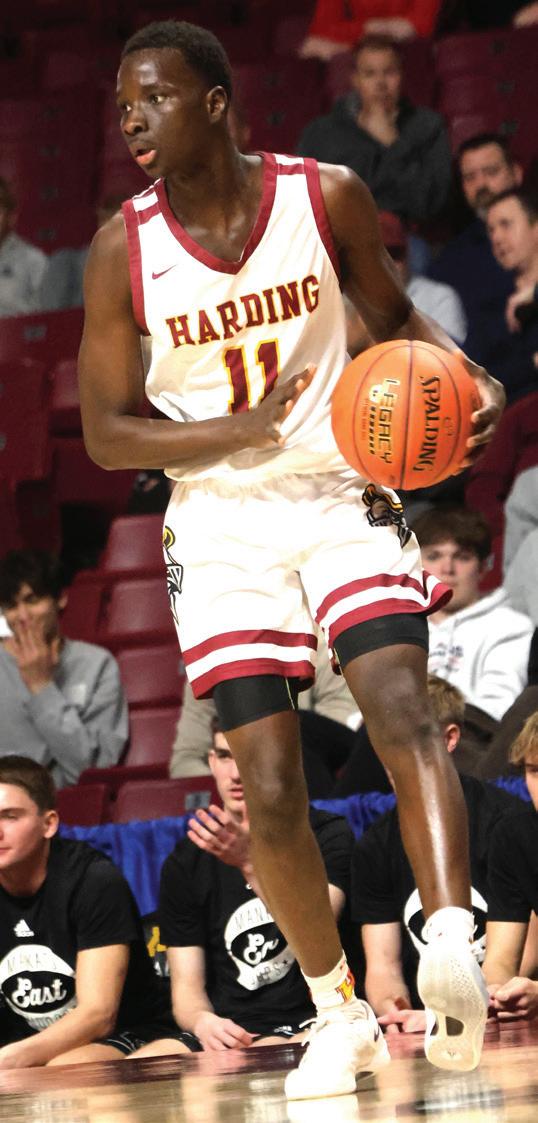
Steve Salaja, qualified for the Class 3A state tournament for the first time in school history.
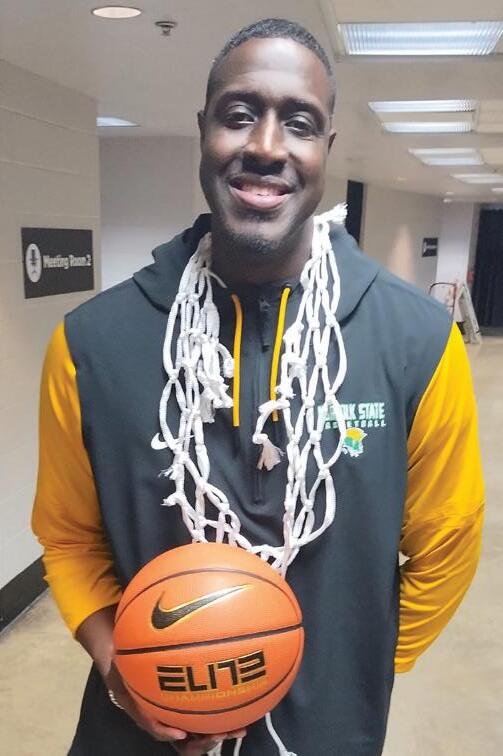
These are words rarely uttered in print or orally about a Black coach upon their hiring at a non-HBCU school.
I asked Vickers after his team’s semifinals win at the MEAC tournament in Norfolk a couple of weeks ago if he has received his rightful due as a coach whether he’s at a Black school or not. “I think there’s different publications
across the country that listed me as one of the best mid-major coaches in the country,” he pointed out.
Vickers’ spectacular resume that got him from Norfolk to Auburn, a public land-grant institution in the Alabama city with the same name, speaks louder than words: four MEAC regular season titles, three
■ See VIEW on page 9
Harding, who finished with an 18-12 record, qualified for the tournament by defeating St. Thomas Academy 66-65 in the Section 3A championship game.
After losing their opening round game to Mankato East 76-33, the Knights did likewise in the consolation bracket, losing 61-54 to DeLaSalle.
to mcdeezy05@gmail.com.
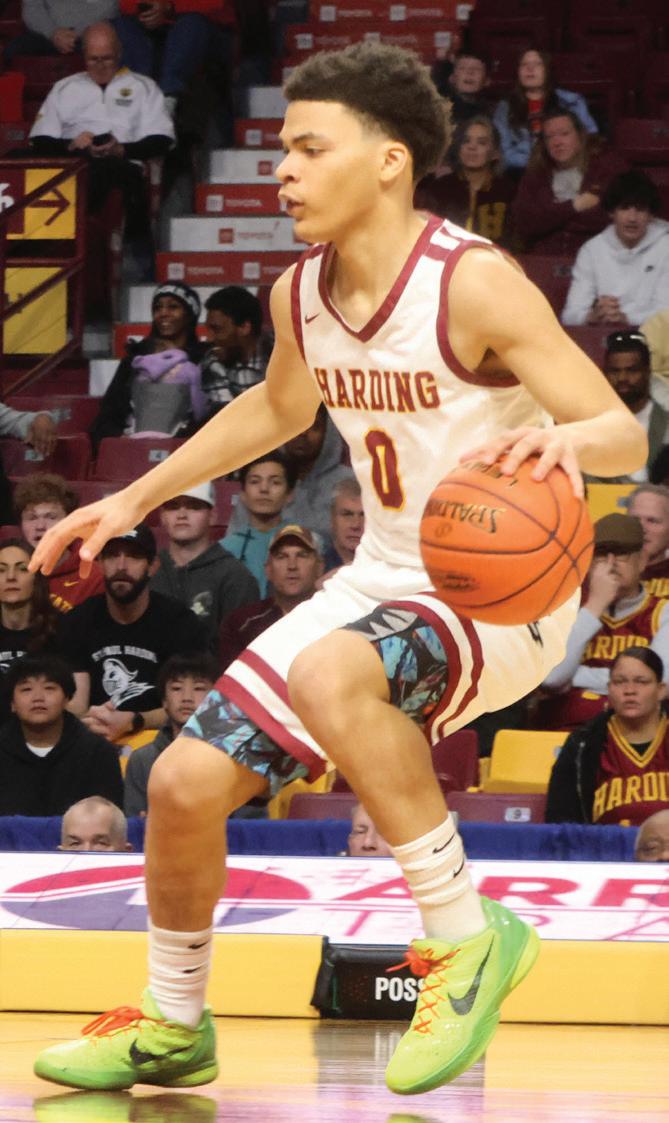


hile on the UCLA campus during a reporting trip in late January, we ran into a Black man standing outside the school’s tennis courts. After asking for directions to Pauley Pavilion, he introduced himself.
UCLA Associate Head Women’s Tennis Coach Rance Brown joined the Bruins coaching staff in 1996, and was promoted to his present position in 2008. He has been an integral part of two national championships (2008, 2014), four runners-up finishes (2004, 2007, 2012, 2015), and made the NCAAs in each of his 26 previous seasons at Westwood.
Brown also is a two-time national assistant coach of the year (2000, 2012) and fivetime Southwest Region assistant coach of the year (1999, 2000, 2007, 2010, 2012).
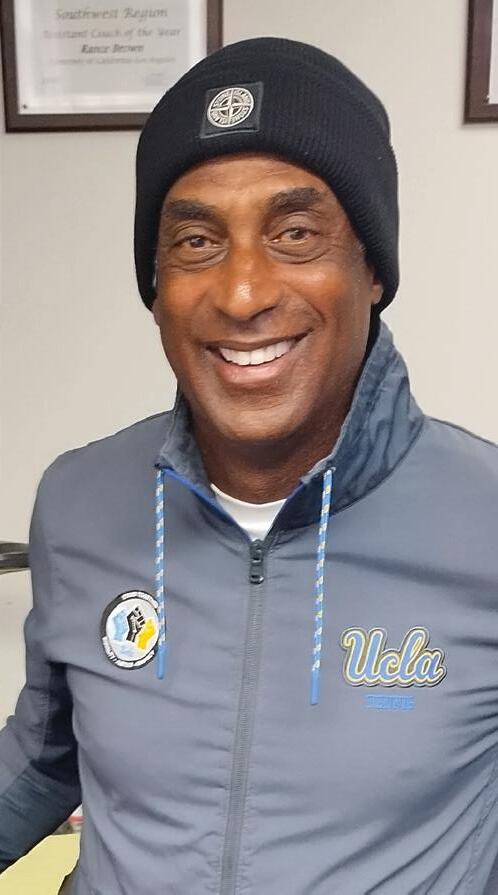
Under his tutelage, two Bruins tennis players won NCAA singles titles (Kari Phebus and Tian Fangran), and his players have also won three NCAA doubles titles. A total of 34 AllAmericans have worn UCLA uniforms during his tenure. Brown also is among a stagnant list of Black assistant women’s tennis coaches. According to the latest NCAA ra-
cial demographics, he is among 29 Black male assistants in all three divisions (3%), a number that has been dwindling for over a decade — the all-time high is 33 in 2016.
On Sunday, April 6, there will be at least one Black coach on both squads when Brown’s UCLA squad hosts the visiting Minnesota Golden Gophers, coached by Lois Arterberry, one of 14 Black head coaches (2%).
“We now have [one] at Arizona State,” Brown pointed out of Jamea Jackson, who was hired last June. “She came from Princeton,” where she was HC for two seasons, he added.
“The diversity is changing slowly by slowly. Fifty percent of the teams have an African American girl playing.”
Admittedly, “The diversity is changing slowly by slowly,” said Brown. “Fifty percent of the teams have an African
By Charles Hallman Sports Columnist
ach year there are plenty of uncommitted local boys’ high school basketball players looking for their next place to continue their studies and playing. This is one of the primary reasons why the Twin Cities Senior Expo was put together shortly after the high school season ends. Minneapolis North was the site last week of this year’s Expo—17 players from six Minneapolis City Conference schools, five St. Paul City Conference schools, and several private schools in the area along with some from the inner ring suburbs — 43 in total scrimmaged and networked in front of invited college coaches March 25.
“There’s still plenty of schools recruiting in the spring,” said Expo Co-Founder Alex Conover, a Minneapolis Public Schools teacher and Prep Hoops photographer. He and Jamil Jackson, founder of the Change Equals Opportunity nonprofit and Camden (Henry)
boys basketball coach, first tried to hold the event back in the spring of 2020. “But it was the exact week that everything shut down due to Covid in March 2020,” recalled Conover.
Even these days where seemingly prep players are being bypassed by many big schools for older players, getting seen is more important than ever, he continued.
“Yeah, it’s definitely harder than ever for a high school kid to find a spot on a college team,” said Conover. Division I schools are “looking to add
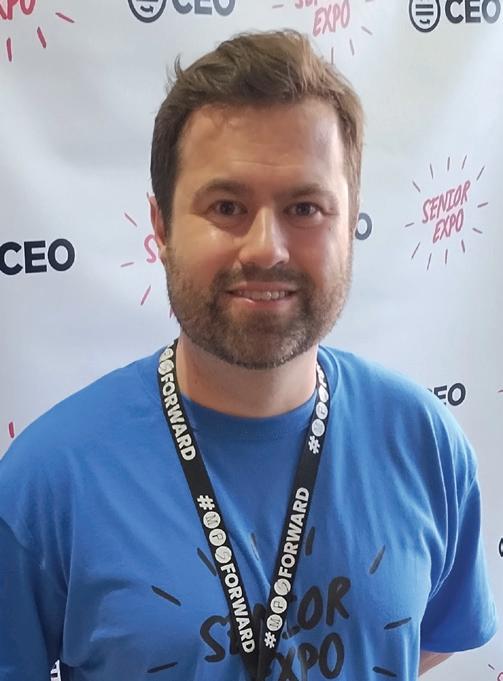
a 21-year-old [through the transfer portal] and not so much an 18-year-old.
“It’s definitely harder than ever for a high school kid to find a spot on a college team.”
“So junior college is a great option. It always has been a great option from the affordability standpoint,” he pointed out. Jackson added that some prep players who are invited
■ See EXPO on page 9
